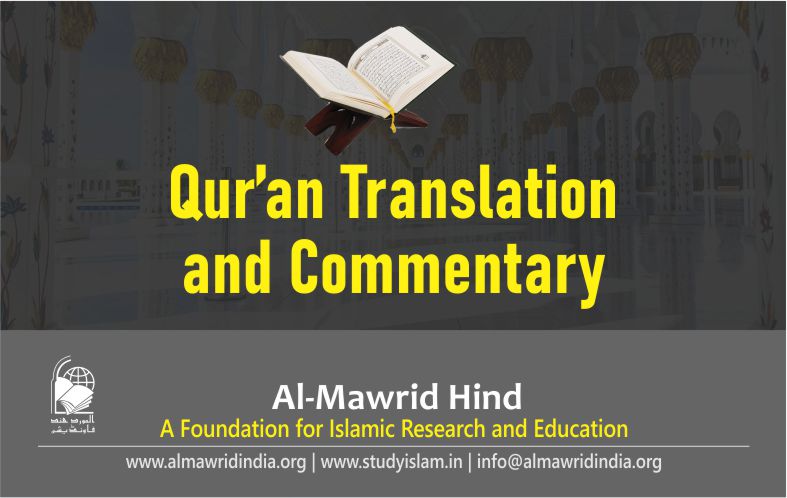Author – Khursheed Nadeem
Translation – Ammar Bakhsh
What days and nights do we spend and with what wiles do we spoil our tongues and pens?
I opened the Quran before suhūr. Surah was in front of me. The Lord of the worlds is establishing the proofs of his message on the Jews and the Christians. Simultaneously, He is setting up from among the second branch of Abraham, the Ishmaelites, a new Muslim nation. The crimes of the Children of Israel are being recounted but I see myself in them. And just then, this question struck me.
I was going through ‘Al Bayan’. The (Urdu) translation of the Quran by our illustrious teacher, Javed Ahmad Ghamidi. What a translation it is indeed; a discovery of a new world. ‘Tafhim ul Quran’ had ruled for ages. Syed Abul-A’la Mawdudi had sought to convey the clear Arabic of Quran to clear Urdu. Praised be the Lord that He bestowed upon him a pen drenched in the fountains of heaven. My companionship with Maulana Mawdudi’s translation of the Quran has led me to ‘Al Bayan’.
The secrets of the Quran that were revealed to Imam Farahi; ‘Al Bayan’ is the third step in its path. The wisdom of the Quran that Imam Farahi has decoded in the chambers of Madrasatul Islah, was the first step through this gate. His works demanded deep pondering over the Quran so as to build the foundations to reach the meaning of the message of Allah. Based on these foundations he even started to write a commentary on the Quran. In a short eventful life, he could only manage to work on the commentary of few of the last Surahs of the Quran. By the grace and mercy of Allah, his illustrious student, Amin Ahsan Islahi, took forward and completed his mission. Thus, the Taj Mahal of the commentaries on the Quran, ‘Taddabur a Quran’ was built by Imam Amin Ahsan Islahi. The torch was then passed to Javed Ahmad Ghamidi and Allah blessed him to complete a 5 volume commentary of the Quran; ‘Al Bayan’.
There are two pillars of this school. The first is that the language of the Quran is the eloquent Arabic spoken by the Quraysh of Umm Al Qura Makkah. The secrets of the Quran cannot be decoded without knowing that Arabic. The second pillar is that the Quran has a specific coherence and consistency in its discourse. This coherence is in the Ayaat, the Surahs and in the Quran as a whole. The Quran is not a collection of isolated wise sayings; it is a coherent discourse. Without decoding this coherence the real message of the Quran cannot be reached. The Imams of the commentary on the Quran nod in agreement. However, it was the genius of Imam Farahi that discovered it and made this into a proper science.
Imam Amin Ahsan Islahi has unveiled this coherence not in his translation but in his commentary on the Quran. If one picks up just the translation of ‘Taddabur e Quran’ the coherence is not evident. They will have to turn to its commentary. Though, a seasoned scholar or reader of commentaries can benefit a lot from this; a normal reader of just the translation cannot afford to go into the technicalities of commentaries. Thus, it was necessary to present this coherence in the translation as well, so that even a layman can observe the beauty of the discourse in the book of Allah. ‘Al Bayan’ fills up this need.
Ghamidi has written in the introduction of his commentary: “This is an Urdu translation of the Quran. The eloquence of this masterpiece from the heaven is impossible to imitate in any other language. I have however tried to present its message keeping with its coherence in Urdu. In this regard, this will be the first translation in which the coherence of the Quran will be visible in its translation. Thus, there will be no need of detailed commentaries on it. “
Islam is nothing but a reminder of the Hereafter. Prophets and Messengers are sent to nations to remind and call to this fact. Every Messenger is a Prophet but every Prophet is not a Messenger. A Messenger acts as God’s judgment on earth for a specific nation. The judgement that God promises in the hereafter for all mankind, is established on this earth for that nation. Messengers are sent for nothing but to establish the proofs of the truth. Syedena (Our Master) Muhammad (peace be upon him) was a Messenger. Allah chose him to establish the proofs for truth for the last time on this earth. Quran is the account of the Messenger’s (PBUH) mission of warning. This mission of warning had many stages. They are in order of occurrence: Warning, Open Warning, establishing the proofs for truth and clearing of all doubts, Migration and Disassociation, Reward and Punishment for the addressees of the Messenger.
According to Imam Islahi, this narration of the Messenger’s (PBUH) mission is divided into seven groups in the Quran. According to him, the Quran has alluded to this while using the phrase “saba mathani” in Surah Hajj. He explains that the seven paired (mathani) mean that each of the seven parts consists of paired Surahs. Most of the seven parts begin with one or more Makki Surahs and end with one or more Madani Surahs. Most of the Surahs in the parts occur in pairs, like Baqarah and Ali Imran.
The effect of the coherence of the Quran on our comprehension of the Quran can be seen while studying ‘Al Bayan’. It is the consensus of this Ummah that the Quran has been arranged by Allah. Also that this arrangement is not the one in which it was revealed. Thus, it is obvious that this arrangement has to have some wisdom. The investigation into the coherence of the Quran is unveiling of this wisdom. Yet there has been no real effort for investigating this coherence in our history of exegesis of the Quran. This coherence cannot be quarried unless one can live in the language of Umm ul Qura Makkah. They have to be familiar with its flow and tenor. Imam Farahi has talked about this in his “Asaleeb al Quran”.
This was no easy task. Imam Farahi spent his whole life to derive these fundamentals. Imam Islahi spent nearly half a century developing and elaborating it. Ghamidi too has spent his life in building and pondering upon it for almost 50 years. ‘Al Bayan’ can be called the result of the work of 3 generations. People tend to think it to be an endeavour of a few years. It is a result of 50 years of patient exercise.
‘Al Bayan’ has a few notes. None the less the translation does away the need for any commentary. The notes seek to elaborate some matter of Fiqh and some intricacies of the language (of the Quran).
These days I have Surah Al-Baqarah in front of me. The delinquencies of the Jews are recounted. They established a covenant with God and then broke it. They kept on establishing it and then breaking it. The coherence of discourse is so clear in the translation that it feels steady and continuous. It becomes so clear that I can feel that while recounting the crimes of the Jews that God tries to remind me that I too have a covenant with Him. Am I even aware of this?
These are the days of Ramadhan. My Lord has turned a special attention towards me. Where am I wandering then?
Note: Al-Bayan is the first ever translation of Quran based on the principle of coherence in Quran. The author Javed Ahmad Ghamidi is a world renowned scholar and thinker with around half a century of research on Islam.



